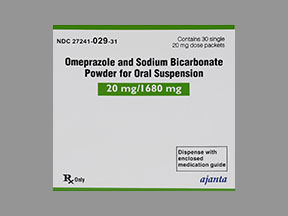
Omeprazole-sodium Bicarbonate Coupons & Savings Card – Discount Prices from $221.64
Generic for: Zegerid, Zegerid otc, Cvs omeprazole-sod bicarbonate
My prescription
Edit
20-1680MG, Omeprazole-sodium Bicarbonate (30 Packets)
Select pharmacy

CVS
$221.64
COUPON PRICE
Albertsons
$257.13
COUPON PRICE
Walgreens
$288.30
COUPON PRICE
Walmart
$2511.07
COUPON PRICEOmeprazole-sodium Bicarbonate savings card
Show this card to your pharmacist
CVS
$221.64
BIN
ID
PCN
GRP
019876
LH01B5EFB8
CHIPPO
LHX
Powered by
More prescriptions for heartburn
More prescriptions for heartburn
Price history for Zegerid (brand) & Omeprazole-sodium Bicarbonate (generic)
30 Packets, 20-1680MG
Average retail price for Zegerid
Average retail price for Omeprazole-sodium Bicarbonate
Average SaveHealth price for Omeprazole-sodium Bicarbonate
Our price history data is based on aggregated prescription data collected from participating pharmacies in America. Our prescription data updates daily to reflect the latest price changes. If you notice a missing data point, it means there wasn't sufficient data available to generate a monetary value for that date.
We analyzed Omeprazole-sodium Bicarbonate prices for (20-1680MG, 30 Packets) over the last 12 months. The average retail price was $3587.02, while the average price using the SaveHealth discount card was $376.71. That's a savings of approximately 89.50% when using our Omeprazole-sodium Bicarbonate coupon.
Compared to the generic version, Zegerid had an average price of $3892.99 over the same time period. With the SaveHealth savings card, Omeprazole-sodium Bicarbonate is 90.32% cheaper on average than Zegerid.
*Retail prices are based on pharmacy claims data, and may not be accurate when we don't have enough claims.
Omeprazole-sodium Bicarbonate dosage forms
Dosage Quantity Price from Per unit 20-1680MG 30 Packets $221.64 $7.39 20-1680MG 14 Packets $113.19 $8.09 20-1680MG 90 Packets $636.33 $7.07 40-1680MG 30 Packets $221.64 $7.39
| Dosage | Quantity | Price from | Per unit |
|---|---|---|---|
| 20-1680MG | 30 Packets | $221.64 | $7.39 |
| 20-1680MG | 14 Packets | $113.19 | $8.09 |
| 20-1680MG | 90 Packets | $636.33 | $7.07 |
| 40-1680MG | 30 Packets | $221.64 | $7.39 |
Omeprazole-sodium Bicarbonate Warnings
The following safety information outlines potential risks and important precautions for using Zegerid (omeprazole / sodium bicarbonate). Review these points carefully and discuss any concerns with your healthcare provider.
Consultation Needed: If your symptoms are initially relieved by Zegerid but then return, consult your healthcare provider. Recurring symptoms could indicate a more serious condition, such as stomach cancer, requiring further investigation.
Kidney Damage: There is a potential risk of kidney damage during treatment with proton pump inhibitors (PPIs) like omeprazole. Symptoms such as blood in the urine, altered urination patterns, nausea, fever, or confusion require immediate medical consultation.
Severe Skin Reactions: Rare but serious skin reactions, including Stevens-Johnson syndrome (SJS) and toxic epidermal necrolysis (TEN), may occur. Seek immediate medical attention if flu-like symptoms accompany skin rash, blisters, or peeling.
High Sodium Content: Zegerid contains sodium, which may lead to swelling and weight gain. Patients on low-sodium diets or with conditions like heart failure or hypertension should consult their provider before use.
Acid-Base Imbalance: Extended use or combination with calcium supplements or milk can lead to Milk-alkali syndrome, affecting kidney function. Symptoms such as nausea, frequent urination, headache, or dizziness warrant a discussion with your provider.
Severe Diarrhea: This medication can increase the risk of bacterial infections causing severe diarrhea. If experiencing persistent watery diarrhea, fever, or stomach pain, contact your healthcare provider. Minimize risk by using the lowest effective dose for the shortest necessary duration.
Bone Fractures: Long-term or high-dose use of Zegerid may increase fracture risk. Consider vitamin D and calcium supplementation and discuss bone health strategies with your provider.
Lupus Risk: PPIs might trigger or exacerbate lupus, with symptoms potentially appearing from weeks to years. Minimize risk by using the lowest effective dose for the shortest time. Consult your provider about symptom monitoring.
Drug Interactions: Zegerid can interact with numerous medications, including warfarin, methotrexate, and some HIV treatments. Inform your healthcare provider and pharmacist of all medications, vitamins, and supplements you are taking to avoid adverse interactions.
Nutrient Deficiencies: Long-term use (over a year for magnesium and over three years for vitamin B12) may lead to deficiencies. Monitor levels if using Zegerid for extended periods.
Stomach Growths: Rarely, prolonged use can result in small stomach growths. Minimize treatment duration to mitigate this risk.
Contraindications: Do not use Zegerid if you are taking rilpivirine-containing medications or have a known allergy to benzimidazoles. Always consult your healthcare provider if these conditions apply.
Omeprazole-sodium Bicarbonate Side Effects
Common side effects:
- headaches
- stomach pain
- diarrhea
- nausea
- gas
- vomiting
Less common but important to monitor:
- dizziness
- rash
- constipation
- lack of energy
- symptoms of an upper respiratory infection
Serious side effects:
- severe diarrhea
- serious kidney issues
- severe skin reaction
- low magnesium levels
- severe intestinal condition caused by C. difficile
- vitamin B-12 deficiency
- severe allergic reactions
Omeprazole-sodium Bicarbonate Interactions
Interactions with high risk of serious adverse effects and should be avoided:
- Rilpivirine
- Esomeprazole
Interactions with moderate risk that may require dose adjustment, closer monitoring, or timing changes:
- Atazanavir
- Erlotinib
- Clopidogrel
- Memantine
- Methotrexate
- Nelfinavir
- Pazopanib
Interactions with low risk that usually do not require a change in therapy:
- Digoxin
- St John's Wort
- Warfarin
- Ketoconazole
